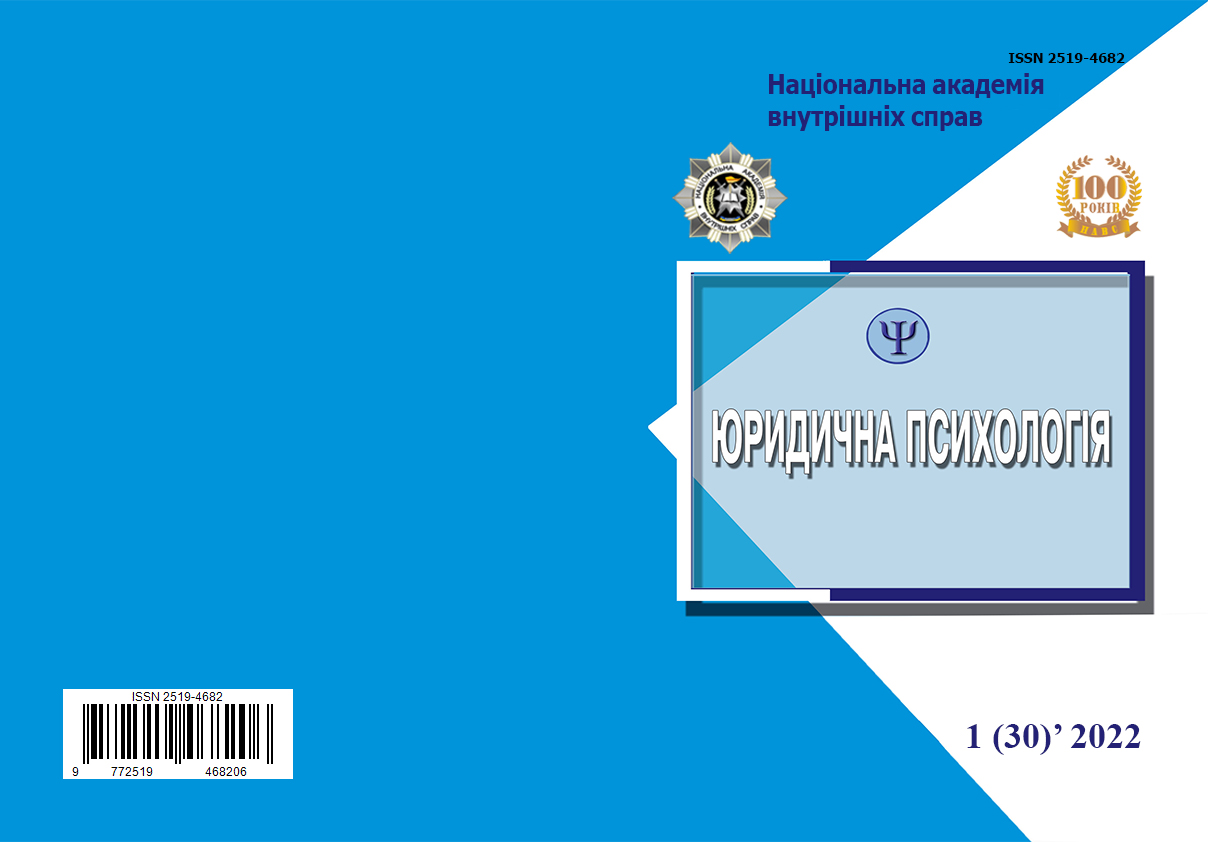Peculiarities of Interrogation Tactics during the Investigation of Illegal Possession of a Vehicle
Abstract
Peculiarities of interrogation tactics during the investigation of illegal possession of a vehicle are accompanied by the need to solve a number of problematic issues, in particular, regarding the detection of all facts of illegal activity; establishing accomplices, methods, means and circumstances of committing a criminal offense. Investigative (research) actions are an important method of obtaining evidentiary information, and the first among them is interrogation. Consideration of procedural, organizational, tactical, psychological provisions determine the success of interrogation tactics. The purpose of the article is to form the basics of interrogation tactics of a suspect, witness, victim in the process of illegal possession of a vehicle. Achieving the set goal consists in performing the following tasks: determining the conditions of the interrogation during the investigation of illegal possession of a vehicle; highlighting the list of main issues that must be clarified during the interrogation of participants in criminal proceedings under the given conditions; disclosure of the peculiarities of the use of tactical techniques in the process of pre-trial investigation, depending on the investigative situation and other factors. Methodology. In the research process, both general scientific and special, namely special-legal methods were used: comparative-legal, system-structural, and the method of system analysis. Scientific novelty. The importance of taking into account the psychological features of the process of obtaining statements was noted, because the specifics of the investigator's professional activity repeatedly confirm the admission of false statements by individual participants in criminal proceedings during a pre-trial investigation into the facts of illegal possession of vehicles. The key to preventing, preventing, and stopping the giving of knowingly false statements by participants in criminal proceedings is to study the materials of the criminal proceedings and the identity of the interrogated person during the preparation for the interrogation. You should also use methods of detection and elimination of lies, which are based on psychology: consistent presentation of evidence; method of «indirect interrogation»; sudden questioning; slowed or accelerated pace of interrogation; use of «weak places» of the interrogated; creating an exaggerated impression of the investigator's awareness, etc. Conclusions. Interrogation is a verbal investigative (investigative) action, which is of primary importance in the process of pre-trial investigation, as it provides an opportunity to obtain evidentiary information, but requires taking into account the tactical and psychological features of its conduct. It consists in the application of tactical methods and their systems aimed at establishing psychological contact and overcoming opposition to the investigation of criminal offenses.
Keywords: illegal possession; vehicle; investigation; criminal offense, criminal proceedings; interrogation; tactical reception.
Downloads
References
Криміналістика : підручник / [В. М. Глібко та ін.] ; за ред. В. Ю. Шепітька. Київ : Ін Юре, 2001. 684 с.
Давченко Т. Тактика допиту у кримінальних провадженнях доведення до банкрутства (ст. 219 КК України). Підприємництво, господарство і право. 2020. № 8. С. 310–316. doi: https://doi.org/10.32849/2663-5313/2020.8.51.
Лютий В. В. Значення та особливості проведення слідчого огляду за фактами незаконних заволодінь транспортними засобами, вчинених організованими групами. Актуальні питання досудового розслідування та сучасні тенденції розвитку криміналістики : матеріали Міжнар. наук.-практ. конф. (Харків, 5 груд. 2014 р.). Харків : ХНУВС, 2014. С. 469–471.
Христов О. Л. Протидія незаконним заволодінням транспортними засобами: криміналістичний аспект : монографія. Дніпро : Дніпроп. держ. ун-т внутр. справ, 2017. 148 с.
Чорноус Ю. М. Психологічні основи реалізації тактичних прийомів. Юридична психологія. 2020. № 1 (26). С. 13–22. doi: https://doi.org/10.33270/03202601.13.
Петров С. Є. Розслідування незаконного заволодіння автотранспортними засобами : дис. … канд. юрид. наук : 12.00.09. Київ, 2009. 243 с.
Христов О. Л., Христова Ю. В., Літун О. О. Особливості встановлення осіб, які вчиняють незаконні заволодіння транспортними засобами : навч. посіб. Дніпро : Дніпроп. держ. ун-т внутр. справ, 2017. 80 с.
Сєдакова В. В. Криміналістична характеристика незаконного заволодіння транспортним засобом. Knowledge, Education, Law, Management. 2020. № 6 (34). Т. 3. С. 160–165. doi: https://doi.org/10.51647/kelm.2020.6.3.31.
Патрелюк Д. А. Розслідування незаконних заволодінь транспортними засобами, вчинених неповнолітніми : навч. посіб. Дніпропетровськ : Лопатніков С. Г., 2012. 221 с.
Чорноус Ю. М., Шикоряк М. М. Особливості початкового етапу розслідування злочинів, вчинених іноземцями. Теорія та практика судової експертизи і криміналістики. 2018. Вип. 18. С. 44–52. doi: https://doi.org/10.32353/khrife.2018.05.
Abstract views: 308 PDF Downloads: 173
- Authors reserve the right to authorship of their own work and transfer to the magazine the right of the first publication of this work under the terms of the Creative Commons Attribution License, which allows other persons to freely distribute published work with mandatory reference to authors of the original work and the first publication of an article in this magazine.
- Authors have the right to enter into separate additional agreements on non-exclusive dissemination of the work in the form in which it was published in the journal (for example, to post an article in the institution's repository or to publish as part of a monograph), provided that the link to the first publication of the work in this journal is maintained.
- The journal's policy allows and encourages the posting of articles by authors on the Internet (for example, in electronic storehouses of institutions or on personal websites), both before the submission of this manuscript to the editorial office and during its editorial processing, as this contributes to the creation of a productive scientific discussion and positively affects the efficiency and dynamics of citing the published work.




